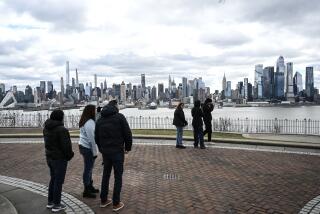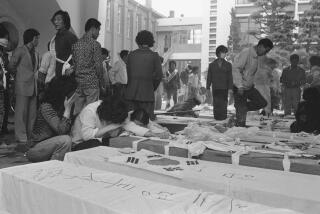Colorado Springs Has Eye Out for Dirty Bomb
Once content to worry about traffic flow and stoplight coordination, John C. Merritt lately has been pondering darker matters.
For example: What if a terrorist scavenged enough radioactive material from workaday medical devices in a hospital and fastened a chip to a newspaper box in a popular park, silently emitting enough radiation to kill anyone who spent 10 minutes near it?
In this quiet bedroom community surrounded by five military bases, including NORAD, which monitors North American airspace, city officials argue that they have to worry about terrorism as much as some of the nation’s biggest cities. And Merritt, the city’s principal traffic engineer, has been designated the point man in an effort to install a monitoring system to detect a dirty bomb or a similar radiological terrorist attack.
The network is in the early stages; the city has obtained four sensors for a test run before it applies for grant money to buy the rest. The goal is for sensors on the city’s traffic lights to sound an alarm at headquarters if they detected significant radiation. Traffic-light cameras automatically would photograph the landscape in all four directions where radiation was registered.
Many U.S. ports have detection devices, as do tunnels into New York City; and some public transportation systems -- such as the Washington, D.C. subway -- have considered installing them.
But Colorado Springs is preparing what appears to be the first citywide system in the nation. Ottawa, Canada, is the only North American city that has such a setup, according to the company that makes the products Colorado Springs is using.
A Los Angeles police spokesman, Lt. Paul Vernon, said that L.A.’s police and fire departments have Geiger counters and dosimeters to measure radiation at a specific site but that there is no citywide monitoring system.
To Merritt, it makes sense that his city of 370,000 be the first American city to go on permanent lookout for dirty bombs. “We’ve got every military base in the world here,” he said. “We’re on the list of top 70 potential terrorist targets.”
Bruce Hoffman, a terrorism expert and director of the Rand Corp. think tank’s Washington office, understood the city’s logic. “In the post-9/11 world, it’s hard to say what doesn’t make sense,” he said. “The proclivity for everyone is to err on the side of caution.”
But the arrival of dirty-bomb monitors in Colorado Springs has as much to do with happenstance and the oddities of government funding as it does anti-terrorist strategy.
Merritt stumbled on the idea as he was networking all of the city’s traffic signals this year: What other information could be broadcast over the radio network he was launching, which covered 1,500 square miles?
He thought of the neighboring military facilities and terrorism and began to contemplate a system to spot possible threats entering Colorado Springs. Merritt couldn’t find technology adaptable to traffic lights that could detect chemical attacks, but he did find such technology for radiation.
Now Merritt dreams of securing funding from the Department of Homeland Security to set up the traffic-based detection system in Colorado Springs -- and beyond. “Homeland Security’s got more money than all of us put together,” Merritt said. “What if we can get Homeland Security to put all these things in, but also put in new traffic signals?” He cited a recent study that gave the U.S. a grade of D for its coordination of traffic lights. “It’s a big win for my profession,” Merritt added.
Homeland Security officials have spoken about setting up a nationwide network of fixed and mobile radiation detectors, and numerous companies have responded to dirty-bomb fears by designing an array of devices to detect chemical or radioactive attacks. One company has created cellphones that can detect radiation.
After the Sept. 11 attacks, the Canadian government grappled with how to prevent a dirty-bomb attack. It funded Mobile Detect Inc., the Ottawa-based company that manufactures Colorado Springs’ detectors.
“In the U.S. and elsewhere, there has been a real interest in looking at a silver-bullet solution” against every possible attack, which would cost billions of dollars, Mobile Detect President Chris Clarke said. Mobile Detect offers systems that cost millions and “can be purchased and installed now,” Clarke said.
Ottawa police cars and the city’s airport have Mobile Detect scanners, which use 50-year-old technology to detect radiation and newer technology to put all information into a central computer that can pinpoint the source of any threat.
Some skeptics believe that fears of dirty bombs -- and so-called silent bombs that don’t explode but quietly emit lethal radiation -- are overblown.
“Anything that emits radiation is going to be detected” eventually by existing safety measures, said Julian Palmore, a mathematics professor at the University of Illinois at Urbana-Champaign who has written about what he considers overreaction to the possibility of radioactive threats.
As far as a city setting up detectors, he added: “I think that’s ridiculous.”
Hoffman of Rand Corp. disagreed. Citing documents from Al Qaeda camps that suggest Osama bin Laden has studied dirty-bomb possibilities, Hoffman said that a relatively cheap detection system -- Colorado Springs bought its four sensors for $30,000 each, and Mobile Detect said a citywide system would cost $1 million to $2 million -- made sense.
“There’s an inherent deterrent measure,” Hoffman said. “By publicizing that Colorado Springs has this measure, it decreases the chance that terrorists will attack Colorado Springs.”
Instead, he said, terrorists may seek softer targets.
“That’s why, if you have a burglar alarm, you put a sign on your lawn -- ‘Hey, go burglarize my neighbor’s house,’ ” he said.
More to Read
Start your day right
Sign up for Essential California for news, features and recommendations from the L.A. Times and beyond in your inbox six days a week.
You may occasionally receive promotional content from the Los Angeles Times.






